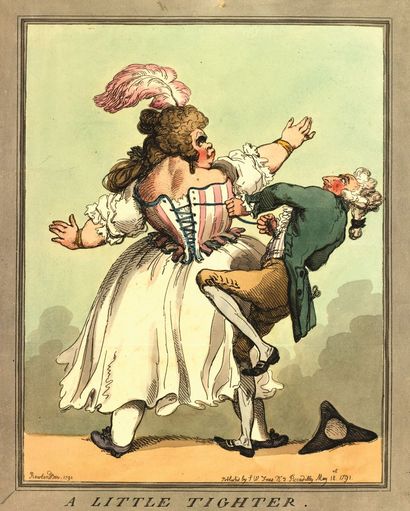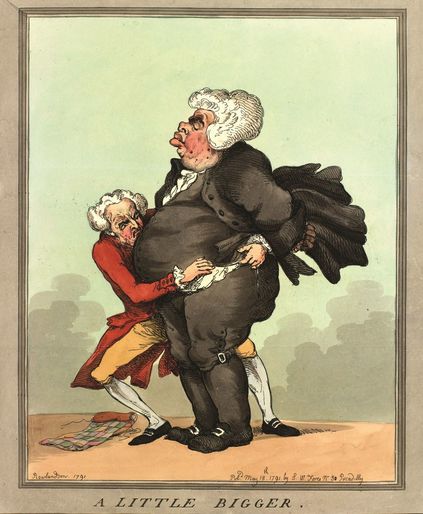Georgian Timeline Patty Baldwin January 2019
The long period of British overseas expansion and domestic industrialisation from the Glorious Revolution until the accession of Queen Victoria from 1688 until 1837 is known as the Georgian period. It also witnessed the evolution of a new sort of village in Box, not wholly reliant on farming and rural occupations.
Satirical illustrations of Georgian people from The New Statesman
|
Box Timeline
1682 Sir George Speke died 1683 Francis Speke died: George Petty inherited Box 1697 Signpost Act encouraged mileposts 1706 Queen Anne at Kingsdown 1707 Rev George Miller (alias Millard) became vicar 1708 Charity School founded in church 1711 Dame Rachel Speke of Hazelbury gave a gift of money for a school to start In the Church 1713 Box Church Restored 1713 Turnpike at Old Jockey 1719 A plot of land next to the Church was donated and a new school was built which could accommodate schoolmaster and some boarders 1720 Webb was owner of Rudloe (Queen Anne reported to have stayed at Hazelbury) 1722 School in Springfield Cottages 1726 Northey family bought Hazelbury, Ashley and Ditteridge 1727 Box Poorhouse built, opened 1729 1729 20 acres of land were purchased with accumulated donations for a school on what is now the Bassetts and Fogleigh House 1737 Old Jockey House inn built 1753 John Poulter, Box Highwayman, arrested 1761 Road through centre of Box completed (now A4) 1766 Wilkes and Liberty riots 1767 Frogmore House, date of rebuilding 1770 Hangman's stile at Fiveways recorded 1773 Andrews' and Dury's first map 1784 Mail coach through centre of Box 1786 The valley around the pumping station in Middlehill was colonised by wealthy people seeking a solution to their illnesses in the medicinal waters. Spa house is the finest relic of this tiny boom. 1793 Spa House, Middlehill, built 1796 Death of George Mullins Senior, Charity Schoolmaster 1805 William Pitt, Prime Minister, at Shockerwick 1805 Somerset Coal Canal opened 1810 Quarryman's Arms became an inn 1825 Thomas Bowdler died 1834 Original Methodist church built 1834 The Poor Law Union; Box Workhouse ceased 1840 Devizes Road completed |
National Timeline
1688 William of Orange invaded England; James II deposed 1689 Toleration Act for Dissenting worship in England 1689 War in North America against France 1690 Battle of the Boyne in Ireland 1694 Bank of England founded 1702 William III died; Queen Anne Stuart succeeded 1714 George I of Hanover succeeds Queen Anne 1721 Sir Robert Walpole became the first Prime Minister 1727 George I died, succeeded by George II 1739 Britain declares war on Spain 1742 Handel's Messiah 1743 George II last British monarch to command army 1746 Bonnie Prince Charlie defeated at Culloden 1756 The Seven Year War with France began 1757 First canal in Britain 1759 James Wolfe captured Quebec, Canada became British 1759 Robert Clive brings India under British rule 1760 George III succeeds his grandfather George II 1769 James Cook landed in New Zealand 1770 Cook landed in Botany Bay, Australia 1771 Factory Age started with Britain's first cotton mill 1773 Boston Tea Party 1776 America declared independence July 4 1776 Adam Smith The Wealth of Nations 1779 First cast iron bridge at Ironbridge 1780s Industrial Revolution begins 1783 Arkwright's steam-powered cotton mill 1787 First fleet of convicts sails to Australia 1788 First edition of The Times of London is published 1789 French Revolution started 14 July 1793 Britain went to war with France 1796 Edward Jenner invented small pox vaccination 1801 Act of Union creates the United Kingdom 1804 Richard Trevithick built the first steam locomotive 1805 Lord Nelson defeated Napoleon at Trafalgar 1807 Britain abolishes the slave trade 1815 Duke of Wellington defeated Napoleon at Waterloo 1820 George III died, succeeded by son George IV 1825 First steam locomotive passenger service 1830 George IV died, succeeded by his brother William IV 1832 Great Reform Act passed 1833 Factory Act restricted work hours |

